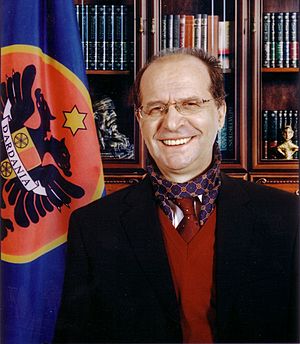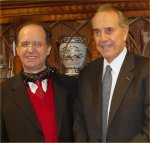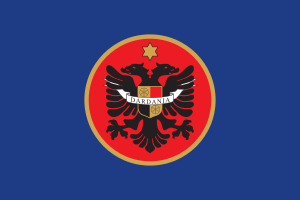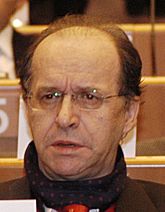Ibrahim Rugova facts for kids
Quick facts for kids
Ibrahim Rugova
|
|
|---|---|

Official portrait, 2001
|
|
| President of Kosovo | |
| In office 25 January 1992 – 21 January 2006 |
|
| Preceded by | Office established |
| Succeeded by | Fatmir Sejdiu |
| Leader of Democratic League of Kosovo | |
| In office 23 December 1989 – 21 January 2006 |
|
| Preceded by | Office established |
| Succeeded by | Fatmir Sejdiu |
| Personal details | |
| Born | 2 December 1944 Crnce, Democratic Federal Yugoslavia (now Kosovo) |
| Died | 21 January 2006 (aged 61) Pristina, Kosovo under UN administration |
| Political party | LDK (1989–2006) |
| Spouse | Fana Rugova |
| Children | Mendim Rugova Ukë Rugova Teuta Rugova |
| Awards | Hero of Kosovo |
| Signature | |
Ibrahim Rugova (2 December 1944 – 21 January 2006) was an important political leader, writer, and scholar from Kosovo. He was the President of Kosovo from 1992 until his death in 2006. He led a peaceful movement for Kosovo's independence from Yugoslavia. He also worked to get support from the United States and Europe, especially during the Kosovo War.
In 1989, he started a political party called the Democratic League of Kosovo (LDK). This party was supported by most of the Albanian people in Kosovo. They wanted Kosovo to become independent using peaceful methods. The LDK even set up a "shadow government." This government provided important services like education and healthcare to the Albanian people. It was like a parallel state.
In May 1992, Rugova was chosen as the President of this parallel state. Later, in March 2002, he was elected President of Kosovo. This happened when the United Nations was helping to run the area. He stayed in this job until he passed away in January 2006. After his death, he was given the title Hero of Kosovo.
Contents
Early Life and Family Background
Ibrahim Rugova was born on December 2, 1944. His family was part of the Kelmendi Albanian clan. At that time, most of Kosovo was joined with Albania. This area was controlled by Italy and later by Germany during World War II.
Yugoslavia took control again in late 1944. This happened after the Bulgarian Army and Yugoslav partisans fought against Albanian groups. Sadly, his father and grandfather were killed by Yugoslav communists in January 1945. Rugova went to primary school in Istok and high school in Peja. He finished high school in 1967.
He studied literature at the University of Prishtina and the University of Paris. He earned a special degree for his work on Albanian literature. Rugova believed in the history of ancient Kingdom of Dardania. This was an old kingdom that included modern-day Kosovo. He used this history to help build Kosovo's identity. He also wanted Kosovo to have closer ties with Western countries.
As a student, he joined a movement for the rights of Albanians. He also became a member of the Communist League of Yugoslavia. He worked as an editor for important literary and scholarly magazines. He also did research at the Institute of Albanian Studies. In 1988, he became the president of the Kosovo Writers Union.
Political Journey
Rugova started his political career in 1989. He became the leader of the Democratic League of Kosovo (LDK). This new party was against Serbia taking away Kosovo's self-rule. In 1992, Rugova won the first election for president of the Republic of Kosova. This was a state that was declared independent by Kosovo's leaders, but it was not recognized by other countries.
Serbia, led by Slobodan Milošević, still had control over Kosovo in the 1990s. But the Albanian people did not cooperate with Serbia. The Republic of Kosova collected money from Kosovars living in Kosovo and abroad. They used this money to create their own schools and healthcare for Albanians.
In the 1980s, there was a lot of tension in Kosovo. Serbs were unhappy with how they were treated by Kosovo's leaders. Kosovo's leaders were also unhappy because they did not have enough power from Belgrade, the capital of Yugoslavia. In 1989, Serbian President Milošević took away Kosovo's self-rule. This led to many human rights problems. About 130,000 Kosovo Albanians lost their jobs. The police force also removed almost all Albanians.
Kosovo Albanian leaders and intellectuals were strongly against Milošević's actions. Rugova was one of 215 people who signed an "Appeal of Kosovo Intellectuals." This appeal was against Milošević's decision to change Kosovo's status. Because of this, Rugova was removed from the Communist Party.
In December 1989, Rugova and others started the Democratic League of Kosovo (LDK). This party was created to oppose Milošević's policies. Rugova became the leader. The LDK became very popular. Within a few months, 700,000 people joined, which was almost all adult Albanians in Kosovo.
The LDK set up a "shadow government" and a "Parallel Social System." These systems provided education and health services to the Albanian people. This was because they were either excluded from Serbian services or chose not to use them. An underground Kosovo Assembly was also formed. This shadow government was mostly funded by Kosovars living abroad, especially in Germany and the United States. However, only the government of Albania officially recognized Rugova's government.
The Kosovo Albanians refused to vote in Yugoslav and Serbian elections. They believed that voting would make Milošević's government seem legitimate. In May 1992, Kosovo held its own elections. Rugova won by a large majority and was elected President of Kosovo. Even though these elections were held secretly and faced challenges, it was generally accepted that Rugova was the rightful winner.
In 1991, the Yugoslav wars began. Slovenia and Croatia left Yugoslavia. By 1992, Yugoslavia was busy with wars in Croatia and Bosnia. It did not have enough soldiers to deal with other conflicts. Rugova supported Kosovo's independence. But he was strongly against using force to achieve it. He feared a terrible war like the one in Bosnia. Instead, he promoted a policy of Gandhi-like passive resistance. He believed that wisdom meant avoiding a disaster.
The Serbian and Yugoslav governments often bothered LDK activists. They said the shadow government was illegal. However, they did not completely shut down the LDK. They also allowed Rugova to travel outside the country. It seems Milošević thought Rugova was useful in preventing an uprising in Kosovo. A rebellion would have been hard for Yugoslavia to handle while fighting wars in Croatia and Bosnia.
Rugova stayed firm in his position throughout the 1990s. He refused to negotiate with Serbia unless it was about Kosovo's full independence. A compromise happened in 1996. He made an agreement with Serbia about education. This meant that the parallel Albanian education system would not be combined with Serbia's system.
Moving Towards War
Rugova's peaceful resistance plan was very popular with the Kosovo Albanian people. They had seen the terrible violence in Croatia and Bosnia. They did not want a similar situation. However, the Dayton Agreement of 1995, which ended the Bosnian War, weakened Rugova's position. This agreement did not mention Kosovo. The international community also did not make serious efforts to solve Kosovo's problems.
Some radical Albanians in Kosovo began to think that the only way to get independence was to start an armed uprising. They believed this would force other countries to get involved. They blamed Rugova's peaceful policy for Kosovo not becoming independent. On September 1, 1996, Rugova and Slobodan Milošević signed an agreement about education for Kosovo Albanian children.
In 1997, the Kosovo Liberation Army (KLA) appeared. They started attacking Serbian civilians, police, and Albanians they saw as "collaborators." As the KLA expected, Serbia responded with strong and often harsh actions. By 1998, the KLA had become a large guerrilla army. 100,000 Kosovo Albanians became refugees. Kosovo was almost in a civil war.
Rugova was re-elected president in the same year. He also received the Sakharov Prize for Freedom of Thought from the European Parliament. But by then, the KLA was becoming more powerful than him. This was clear in February 1999. The KLA's political leader, Hashim Thaçi, was chosen to lead the Kosovo Albanian team for the Rambouillet Agreement talks. Rugova was not chosen.
In late March 1999, the talks at Rambouillet failed. NATO then started Operation Allied Force. This was an air campaign to stop Yugoslav actions in Kosovo. Rugova and his family were held under house arrest in Pristina for the first few weeks of the war. In early April 1999, Rugova was forced to go to Belgrade. He was shown on Serbian state television meeting Milošević and asking for the war to end.
Rugova was allowed to leave Kosovo and go to Italy in early May 1999. This was shortly before the war ended. He received more criticism for taking a long time to return to Kosovo. He did not come back until July. However, he was welcomed as a hero. He returned to political life under the new United Nations administration in Kosovo.
After the War

Even though Rugova's political standing was hurt during the war, he quickly regained public support. He won a big victory against his political rivals from the KLA. The KLA fighters were first seen as heroes by Kosovo Albanians. But later, many people became unhappy with them. This was because of reports of organized crime, threats, and violence against political opponents and other groups in Kosovo.
In October 2000, elections were held in Kosovo. The LDK won by a large margin, getting 58% of the votes. Hashim Thaçi's party, linked to the KLA, only got 27%. On March 4, 2002, Rugova was appointed president by the Kosovo Assembly. This happened after long political talks. Rugova lived to see Kosovo's Constitution approved by a freely elected parliament.
As the new President of Kosovo, Rugova continued to work for Kosovo's full independence. This time, the international community officially recognized him. He insisted that independence must be achieved peacefully. He also wanted very close relationships with the United States and the European Union. Some radical groups criticized his slow approach. But he tried to bring along the supporters of the former KLA. In November 2004, he appointed Ramush Haradinaj, a former KLA commander, as Prime Minister. The next month, Rugova was elected president again by the Kosovo Assembly.
However, he still faced violent opposition. On March 15, 2005, he survived an assassination attempt. A bomb exploded in a trash can as his car drove by, but he was not hurt.

Rugova had some unique habits as president. He often wore a silk neckscarf. This was a symbol of the oppression in Kosovo. He was also known for giving visitors samples from his rock collection. The size of the crystal could show how Rugova felt about a meeting. This made diplomats compare notes about the rocks they received. He was also a chain-smoker, which might have caused his health problems.
On August 30, 2005, Rugova left Kosovo for medical treatment in Germany. He had been treated in Pristina and at a US military base in Kosovo. After a week, he returned to Kosovo. On September 5, 2005, he announced that he had lung cancer. But he said he would not resign from his job as president. He received chemotherapy at his home in Pristina. However, the treatment did not cure the cancer. He passed away four months later, on January 21, 2006. He was buried on January 26. His funeral was attended by leaders from the region and about one and a half million people.
Books by and about Ibrahim Rugova
- Prekje lirike, [Lyrical Touches], essays, Rilindja, Pristina, 1971
- Kah teoria, [Towards Theory], essays, Rilindja, Pristina, 1978
- Strategjia e kuptimit, [Strategy of Meaning], essays, Rilindja, Pristina, 1980
- Vepra e Bogdanit 1675–1685, [Bogdani's Oeuvre 1675–1685], monograph study, Rilindja, Pristina, 1982
- Kahe dhe premisa të kritikës letrare shqiptare 1504–1983, [Directions and Premises of Albanian Literary Criticism 1504–1983], monograph study, Instituti Albanologjik, Pristina, 1986
- Refuzimi estetik', [Aesthetic Rejection], essays, Rilindja, Pristina, 1987
- Pavarësia dhe demokracia, [Independence and Democracy], interviews and other occasional pieces, Fjala, Pristina, 1991
- Çështja e Kosovës, [The Kosovo Issue], (together with Marie-Françoise Allain and Xavier Galmiche), Dukagjini, Peć, 1994
- Ibrahim Rugova: “La frêle colosse du Kosovo” , Desclée de Brouwer, Paris, 1999
- Kompleti i veprave të Ibrahim Rugovës në tetë vëllime [Ibrahim Rugova's Oeuvre in eight volumes], Faik Konica, Pristina, 2005.
- On the first anniversary of Rugova's death, the Kosovo Presidency published a book entitled President Rugova. It had a Preface by President Fatmir Sejdiu and an introduction by Sabri Hamiti. The book collects some of the President's major speeches.
- Rugova: Vizioni nacional, a publicistic book by Vehbi Miftari, „AIKD”, 2007
- Rugova: The symbol of independence, a publicistic book by Vehbi Miftari „AIKD”, 2008
- Rugova – mendimi, kultura, politika, a book by Vehbi Miftari, 2010
- The Winter Of Great Despair by Jeton Kelmendi
Honors and Awards
- 1995 Peace Prize of Paul Litzer Foundation, Denmark.
- 1996 Honorary Doctorate of University of Paris VIII: Vincennes—Saint-Denis, France
- 1998 Sakharov Prize of the European Parliament.
- 1998 Homo Homini Award for human rights activism, People in Need
- 1999 Peace Prize, City of Münster
- 1999 Honorary Citizen of the Cities of Venice, Milan and Brescia (Italy).
- 2000 Peace Prize of the Democratic Union of Catalonia, Barcelona, Spain.
- 2003 Prize European Senator of Honour.
- 2004 Honorary Doctorate of Tirana University.
- 2006 National Flag Order (after his death), by President of Albania Alfred Moisiu
- 2007 Order "Hero of Kosovo" (after his death), by President of Kosovo Fatmir Sejdiu
- 2013 R7 Motorway in Kosovo linking with Albania was named after him
See also
 In Spanish: Ibrahim Rugova para niños
In Spanish: Ibrahim Rugova para niños
- Democratic League of Kosovo
- History of Kosovo
- Kosovo Liberation Army
- Operation Allied Force
 | Ernest Everett Just |
 | Mary Jackson |
 | Emmett Chappelle |
 | Marie Maynard Daly |


